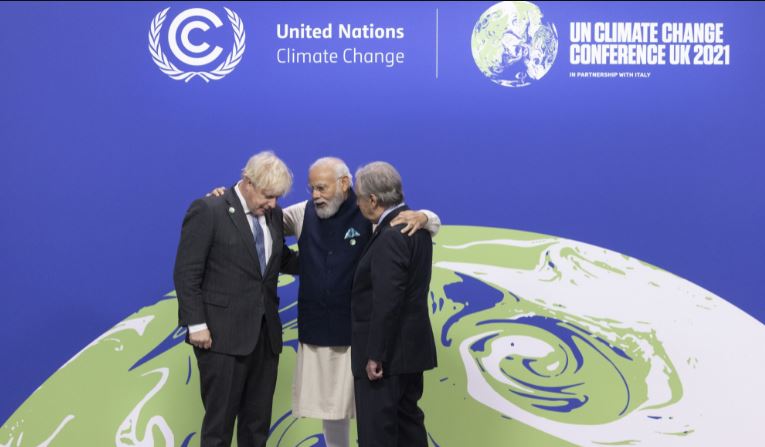New Delhi: After two days of high-level announcements and speeches, the World Leaders Summit at COP26 has concluded. More than 100 heads of state and government took the podium to set the tone for the much anticipated UN climate conference (COP26). Over the coming days, negotiators will continue working towards a formal outcome November 12.
Responding to high-level announcements, World Resources Institute President & CEO Ani Dasgupta told IANS: “The first two days of COP26 offered the world a sharp reminder of the urgent need to accelerate climate action.
“You can feel a sense of excitement and determination to move the agenda forward. Many leaders announced serious new climate plans, partnerships and finance commitments. Now attention shifts to the negotiators who need to work together to deliver what is necessary to accelerate climate action this decade.”
Among the highlights of the first days were commitments to halt deforestation by 2030 and significantly cut methane emissions, along with a number of new net-zero pledges and increased commitments on adaptation finance.
One of the most awaited announcements was India’s suite of near-term actions for a strengthened 2030 climate plan and commitment to reach net-zero by 2070.
There were also new finance commitments by countries like Japan, Spain and Switzerland. Scotland pledged a million pounds to support developing countries experiencing losses and damage from climate impacts beyond what they can adapt to, the first of its kind.
“The world has made major strides since the Paris Agreement was forged, though action is still not fast or ambitious enough. Before Paris, the planet was on a path to heat up as much as 4 degrees Celsius by the end of this century,” Dasgupta said.
“We are looking for countries to build on this momentum in the coming days. Negotiators must work to spur a renewed spirit of solidarity. Developed countries should come forward with details on their additional financial pledges to meet the $100 billion annual commitment, including making up for any shortfalls, and agree on the process for setting the next goal of financial support to developing countries,” he said.
According to him, major emitters with insufficient 2030 climate plans should agree to come back to the table with stronger ones by 2023. Outside the negotiations, countries, businesses, investors and other actors should back their bold promises with action, financial resources and accountability.
In the past two days, more than 100 countries signed the Global Methane Pledge, covering nearly half of global methane emissions and 70 per cent of global GDP. Countries signing the pledge are committed to collectively reduce methane emissions by at least 30 per cent by 2030, relative to 2020 levels.
Delivering on the pledge would avoid 0.2 degrees of warming by 2050.
Responding to the announcement of a new alliance to tackle methane emissions, Kat Kramer, Christian Aid’s climate policy lead, told IANS: “Today’s (Tuesday’s) anti-methane pledge by nearly 90 countries will be significant, if achieved, potentially reducing warming by 0.3C by the 2040s.
“Methane is a greenhouse gas strongly associated with the fossil fuel industry, with what are known as ‘fugitive emissions’ evaporating from coal mines, from oil and gas extraction and from pipelines. Methane is but another reason why the fossil fuel industry has to end — and soon.”
UK Boris Johnson and his Indian counterpart Narendra Modi launched a new flagship international initiative at the World Leaders Summit.
Jointly led by the UK and India, the new initiative, called “Green Grids Initiative — One Sun One World One Grid” (GGI-OSOWOG), will accelerate the development and deployment of interconnected electricity grids across continents, countries and communities.
Modi said at the launch: “The One Sun One World One Grid and Green Grids Initiative is an idea whose time has come. If the world has to move to a clean and green future, these interconnected trans-national grids are going to be critical solutions. I congratulate the International Solar Alliance and the UK COP Presidency for bringing it nearer to implementation.”
At least 110 leaders representing 85 per cent of earth’s forests signed the COP26 Glasgow Leaders Declaration on Forests and Land Use, committing to halt and reverse deforestation by 2030.
Many companies and international banks also joined political leaders on this journey to fight climate change and save “the lungs of our planet”.
Meanwhile, more than 35 world leaders signed up to the Glasgow Breakthrough Agenda, which will see countries and businesses work together to scale up and speed the development and deployment of clean technologies while driving down costs this decade.
Signatories included the US, India, EU, developing economies, and even some of the nations that are most vulnerable to climate impacts.
More countries have stepped up: India, Thailand, Nepal, Nigeria, and Vietnam made new net-zero pledges which now means that 90 per cent of the global economy is covered by net-zero commitments
Encouraged by deforestation commitments, Wildlife Conservation Society President and CEO Cristian Samper told IANS: “Science has shown that nature can contribute more than a third of the climate solution, and we cannot meet the goals of the Paris Agreement without nature.
“Indeed, forests already keep climate change from being considerably worse — by removing 30 per cent of the carbon-dioxide pollution we add to the atmosphere each year. Forests also buffer climate extremes. And tropical forests cool the planet directly and are the source of rainfall that is critical to downwind agricultural and hydroelectric production.”
